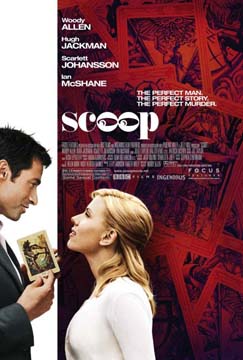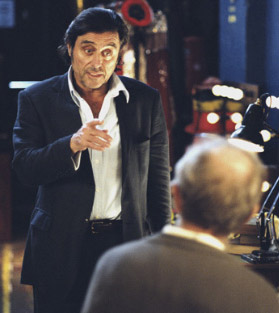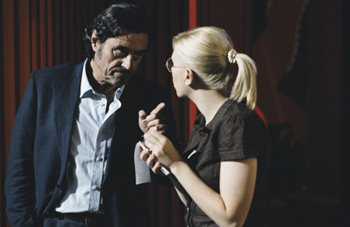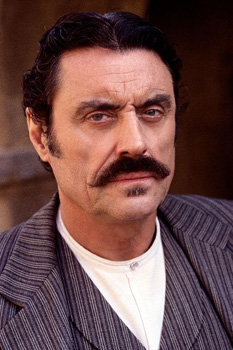 Ian McShane has made a career out of
Ian McShane has made a career out of
playing menacing, immoral men and we love him for it – particularly the dastardly
reckless Al Swearengen of HBO’s ‘Deadwood.’ This week, however, the actor takes
a lighter turn in Woody Allen’s comedy-murder mystery ‘Scoop,’ alongside
Scarlett Johansson, Hugh Jackman and Allen himself.
McShane plays recently deceased
newspaper reporter Joe Strombel, who gets the scoop of his life at a most
inopportune moment – whilst crossing the river Styx. Somehow he makes spiritual
contact with an aspiring young journalist [Johansson], gives her the scoop and
makes her promise to break the story. It’s a fun film, silly at times, but
classic Woody Allen.
CHUD caught up with the actor when he
was in town doing press for the film and talked with him about ‘Scoop,’ the
future of ‘Deadwood’ and the deliciousness of Scarlett Johansson.
Q: How long was your audition for Woody Allen?
McShane: It was one and a half
minutes. He looked me over and liked
what he saw, and that was it. The next day, it was last summer when I was going
back to England, I sat down with I think Juliet [Taylor], his casting lady. I
walked in, they said, “Will you turn around?” I said fine, and then the next
day I was going back to England, and the script arrived with a nice deprecating
note saying, “You might not want to do this, but I’d like you to do it.” So I
said no originally. Of course I didn’t, I said yes. You never know when you may
get to work with Mr. Allen again, so it was great. And then six weeks later
we’re in England doing the movie.
Q: Why did he think you wouldn’t want to do it?
McShane: I think that’s his persona. The
Woody Allen that everybody knows is that. It’s like Charlie Chaplin’s “The Tramp,”
that, you know, what you associate with Woody Allen is the rather nebbish-y
Brooklyn kind of guy. That’s not him at all, he’s very self deprecating, quiet,
charming, lives his own life, he’s so low key. Scarlett [Johansson], I think he
wrote this for because he’d worked with her before, but he’s very charming. It’s
like the way he directs, which is half the time you don’t know he’s there. I
mean, he plans the scene ahead with the camera man, and then he’d find a camera
man in England, I think it’s one of the reasons why he’s there, who he really
liked working with, Remi Adefarasin, who I’d worked with before, and he’s again
a very low key, easy, gentle. He’d plan these scenes with the camera man, and
the stand-ins or whatever, and then you’d go on, and he’d just expect you to
know your lines and do what you do, and after that, there’s very little
directing. There are a lot of English character actors out there – well
obviously the idea of working with Woody Allen appeals to most actors, because
of his body of work, which is great – and they were like, “What’s he like?”
They were expecting a director who was gonna give some magical directing, when
in fact it’s a very simple process. We were finished by mid- afternoon most
days so we could go back and have cucumber sandwiches and tea, whatever.
Q: Do you think it’ll be difficult to find scripts as rich
as ‘Deadwood?’
McShane: Oh ‘Deadwood!’ Well it’s very
different, ‘Deadwood’ is – the acclaim it’s gained is due to David Milch,
there’s nobody like David, just like there’s nobody like Woody Allen. So
working with Milch, which is very different [from] working with Woody. Milch has
a very intense process, partly because it’s television, it’s not like you have
the luxury of working – well actually, we do have luxury, but it’s not like
working on any other TV show. We do tape on ‘Deadwood,’ it’s fifteen working
days usually to do a show, and that was one of the contentious reasons why I
think the show was abruptly halted this year, because it is a very expensive
show to do for television. On the other hand, you’d have thought with the
acclaim it got we could’ve reached some kind of finish, but we will. We’re
going to do two, two-hour movies. Which I think is good, because the way the
series is structured now, which is every episode’s a day in the life of
‘Deadwood,’ literally every episode is one day. Maybe there’s two days in
between, whatever, he couldn’t do that and finish it. So I think two hours
gives you – gives whoever directs them time and space to do like a movie, you
can shift more, you can tell more in a fluid two-hour movie than you can in a
one hour TV episode.
Q: That will be on HBO as well?
McShane: Yeah, we’re doing all the
deals now, it’s supposed to be next year, next May, we’ll do the two, two-hour
movies.
 Q: Is there much difference between the US and UK acting
Q: Is there much difference between the US and UK acting
communities? In terms of people knowing
each other?
McShane: You know, the English, I say
that because, well, there’s not a lot that goes on in England now. It’s either
musicals on stage, rather bad ones, or rather indifferent television. Reality,
we used to lead the way, the so-called perverse television and great shows and
writing. There’s one man Paul Abbott, he’s a little like David much in the
sense he’s done his prolific, very intense, done a lot of great work. But those
are few and far between now, I mean, we started that reality craze, it’s still
going on. It’s sort of dying out now, we hope. But it still dominates
television, it’s cheap television, it dominates everything. That’s the reason,
but mostly it’s theatre. When I say about the characters, I mean, we had some
very prominent, well-known actors come in; they were doing one line for Woody,
because everybody wants to be in a Woody Allen movie. It looks great on your
CV. At the end of the day, you’ve worked with Woody Allen, and he’s done some
amazing films. And this was particularly nice, because I enjoyed it because he
was in it too, so you got to work with him as well, and I think it’s just sort
of a doff your cap to the film he made last year, ‘Match Point’ in England. I
always tend to see trends of other directors, other – the history of cinema in
Woody Allen’s work, you can compare it to other directors. It’s like if you
look at the Fellini period, or the ‘Stardust Memories.’ If you like, you can
compare that to that, not ‘Manhattan,’ not Broadway comedies, but Fellini liked
– what was the other one? I always thought that ‘Match Point’ was kind of a
Hitchcock, that formulized English murder mystery drama, the way it was done. This
sort of tips its wink in the other way, sort of takes the comedy version of
that murder mystery with a twist on it, maybe I’m getting too deep about
cinema.
Q: Was he a fan of British cinema?
McShane: I have no idea what he’s a fan
of. I think he’s his own guy. I think he’s a fan of me, [even though] I don’t
think he’s ever seen ‘Deadwood.’ When Woody works, he goes to work every day,
you know, he has his kids and he has his – he plays clarinet, he loves sports,
he’s a guy from Brooklyn who just happens to make movies for a living, and very
good ones. But that’s his life, you know, he’s not social, it’s not like a
social deal.
Q: What was it like working with Scarlett?
McShane: She’s delicious. I mean, that’s the word I think for Scarlett,
absolutely delicious. They’d done the film the year before, so they had a very
good rapport, which is always nice on a set, it’s easy. She’s a delightful
girl, very smart, down to earth, so it was a very easy, relaxed set, and film
to do indeed. It was only for seven weeks in London, and that’s it, it was much
like an eight-hour day, you got there – it was civilized.
Q: What kind of actress is she?
McShane: Actress? Well delightful in
this, I mean, you do some work with somebody, we got on very well. I’ve seen
her, I think she – what I do think is that she’s been very smart with her choices,
that she hasn’t decided she needs to do a franchise picture or put her name
over the title in some terrible movie. She’s been smart about what she’s chosen
to do, people she’s worked with. She’s a smart kid and extremely nice to work
with.
Q: Did you only get the script pages with just your part on
it, typical Woody Allen?
McShane: Yeah, originally, and then he
asked me if I’d like to read the rest of it, and I said, “No, I don’t want to
read it. When I see the film, I’d like to see only the scenes I’m in, thank
you.” I haven’t seen it yet.
Q: How much of the dialogue was improvised?
McShane: Oh none of it. I think when
Woody was doing his own stuff when he assumes the Great Slendini, he does his
own shtick. He said I could change it, but I didn’t find any need to. I mean,
one or two lines, but it was never improvised, we didn’t do that at all, he
did. When he got down and did his, as I said, his magician stuff, and maybe he
did with Scarlett, but there was no need for me to do it. That’s training on
‘Deadwood,’ because God forbid you should improvise on ‘Deadwood.’ You couldn’t
anyway; you can’t improvise that kind of stuff.
Q: Did you have anyone in mind when you were creating your
character?
McShane: There was a wonderful English
character who’s a reporter I’d known on and off, married to a great friend of
mine, called Ross Benson who died a year and a half ago, sadly, but he was
like, he’d done everything. He’d been in like three wars, he was in Vietnam, he
was in Iraq, the first Gulf War, and he wrote about the West End showbiz-ness.
He was like that hard drinking, been everywhere – and I think I modeled my look
slightly after that, the ??? [9:14] with slight stubble. The old British hack who you tolerate in this
country.
Q: James Garner said he’s not a fan of ‘Deadwood,’ I think
because of the language.
McShane: James Garner? I think it was
Robert Duvall, wasn’t it? Yeah. I used to like James Garner. [laughs] In fact, the series ‘Lovejoy,’ I always –
when I did the series in England, I always tried to make ‘Lovejoy’ a kind
of ‘Rockford Files,’ which is one of my
favorite series, that kind of difficult genre, comedy drama, which they managed
in that. No, I think Duvall talked about – it was Duvall, because Walter Hill
directed that ‘Broken Trail’ and he also directed the pilot of ‘Deadwood.’
 Q: This is the way they actually talked, right?
Q: This is the way they actually talked, right?
McShane: I don’t know if it is the
actual way they talked. Milch says it is, but if you’ve ever met Milch, you know
[he] is a force of nature himself. I think what he did do for ‘Deadwood,’ and
I’m sure they did – I’m sure they didn’t speak like “Yes ma’am,” like
‘Gunsmoke,’ I mean that didn’t go either, that’s a mythologized [version]. But
as Jon Voight said, “If you’re gonna print the proof of the myth, you print the
myth, it’s much better.” What David did I think was create a language, that’s
what he did for ‘Deadwood,’ he created his own language, kind of colorful and
the Shakespearean thing, and the Dublin version of language all the time. I
think he deliberately invented a language for ‘Deadwood.’ I think he’s been forced to defend it in a
way, because that died down, I remember when it first came out, that was what
the contention was, “This is crap, you can’t use these words all the time,” and
David said it made him, if anything, he’s the kind of guy who’d become more
entrenched in his vision, “This is how they talked.”
Q: So it’s more a style choice?
McShane: I think it’s a style choice as
well as a reality. I’m saying it’s a combination, I don’t think they swore
probably as much as we do, but on the other hand, it’s very much a part of the
landscape of the program, and it’s very deliberate. They’re not put in
willy-nilly. David always says we can use those words, but we don’t have to swear
to talk about those words. The one thing I’ll say is if you put one of those
words in the wrong place, you really are fucked. There’s a rhythm to it, those
words, and [fuck] is the most useful word in the English language, you know. It
can be anything you want. And he uses it particularly well.
Q: Do you keep track of ‘Deadwood’ fan response on the
internet?
McShane: Oh, I’ve actually over blown
that, because everybody’s so subjective about what they like, whatever program
you do, I mean, it seems now like everything’s on the net. I was reading an
article yesterday in the Times about ‘Battlestar Gallactica,’ and then they’d [the
fans] respond to, that thing they did recently on ‘Rescue Me,’ where they’d
objected to the ending of the show – a mock rape they called it, so they
disagree with it. I’m not making – you’re making a show, you’re not making a
show according to fan’s response, what the hell is that? It’s not a democracy,
art, you know. It’s one person’s vision, in our show, it is one person. And he
said on the set, it’s a fabulous show to do, but David’s the guy. He’s the
elephant in the room. Like with Woody’s
picture, you’re employed by somebody to be an actor, you’re not employed to be
a director. You can hint along the way, you can add to it, but it’s his vision
of what you’re doing, and I think if fans go, “Oh you’re not doing that,” well,
do your own thing, don’t criticize me. If you like it, you’ll go with it. I
feel it can be a risk, but it can be overboard, that’s what the internet’s
about though isn’t it, is finding a medium?
Q: You’re doing Captain Hook in ‘Shrek 3?’
McShane: Oh yeah, for DreamWorks. Yeah,
Captain Hook finally speaks in ‘Shrek 3.’ It’ll be something my kids can see –
my grandkids can see for once.
Q: Is it hard to keep the swearing out when you switch to
something like that?
McShane: No! No, it’s very strange doing those things
because you literally go in for – I think I’ve done three days, two days, I’ve
got another day to do – but the first day you don’t meet anybody else. You do
all your lines on your own but there are all the animators, all these seventeen
nerds looking at you from the screen. It’s an extraordinary place, DreamWorks.
They have this incredible campus out in Glendale, they call it Nerd Heaven. Koi
ponds and that, they only do animation, it’s beautiful. They do that because
they try to physically adapt the character to look like what you do when you do
it. When they’re doing their drawings, because you do all the dialogue first,
and then they do this stuff. Obviously they’ve got an idea; they’ve done
Captain Hook before, like a background of him playing the piano. But then I
did, Katzenberg asked me in to do this – which we haven’t started yet, ‘Kung Fu
Panda,’ with Dustin Hoffman and Jack Black. I play the bad evil Snow Leopard or
whatever. But what they’ve done there was extraordinary. I went in and the
director said, “We’d like to show you something,” and they’d taken a scene from
the first series of ‘Deadwood’ when I stamp on Trixie’s neck and beat the crap
out of her, and they transferred it to animation. I went, “I know that voice,”
and they’d transferred it to the leopard in something else in the scene. And
I’m doing another thing for the guy who did ‘Corpse Bride,’ something very
different.
Q: Henry Selick?
McShane: Henry Selick, yeah.
Q: Are you going to do ‘Coraline?’
McShane: ‘Coraline,’ yeah, I’m playing
– what am I playing? A sad Russian giant. It’s very good.
Q: It’s a fairly small part, right?
McShane: It’s a small part but it’s
lovely, because those things are fun to do, they really are.
Q: You just go in a day?
McShane: You go in a day and it’s a
chance to do something different, play around, you know, it’s what you do for a
living. You can exercise your voice, and that’s great.
Q: Are you interested in new animation technology like
Motion Capture?
McShane: I’m interested in it when I
see it, I’m not interested in talking about it.
It goes quite completely over [my head].
Q: Are you interested in working with it?
McShane: Yeah, well, mainly I’m
interested in doing it, because it’s something my grandkids can see, because
you know they can’t stay up for ‘Deadwood.’
Q: Just hearing your voice, though.
McShane: They’ll hear my voice, and
they’ll be going, “There’s G.D.” But I
also just finished this film, ‘We Are Marshall,’ with Matthew McConaughey and
McG directing. It’s the story of the football tragedy in 1970 of Marshall
University in West Virginia. A plane went down, it was all about should the school
carry on with the athletic program or should it let it die, that was good.
Q: Who are you in that, the principal?
McShane: No, David Strathairn plays the
principal, I play like the biggest booster in town, who loses his son in the
plane crash. And Matthew McConaughey plays the new coach they bring in, and
Matthew Fox plays the old coach, who stays on to assist him.
Q: How was mcg with the dramatic stuff?
McShane: He’s very good. He wants to break away from that and be a
director. He was very good and very respectful and very, very committed to it,
so we have a nickname, “Direct it and it will come.”
Q: Do you have any stage work lined up?
McShane: No, no, I’m going to stay away
from that for a while. The last thing I did was ‘The Witches of Eastwick,’ the
musical in London, and if it taught you anything it taught you not to do
another musical, thank you very much. It was a great experience, because you
learn something from everything, or else there was no point in doing it, but
nine months of doing a musical can hold me for another nine years maybe, that’s
enough. Eight shows a week, that’s tough.
Q: Did you talk with Hugh Jackman about that at all?
McShane: No, Hugh and I had dinner a
couple of times, but we didn’t meet each other, we don’t see each other because
I’m dead [in the film].
 Q: The ‘Deadwood’ movies, have you seen scripts yet?
Q: The ‘Deadwood’ movies, have you seen scripts yet?
McShane: Oh no, we never see scripts
when you do the show, never mind the movie. No, because it’s done on a very –
you know, David has got it all in his head, so David brings it, like he usually
appears to you, the script usually appears maybe a day, two days before, and
the email will suddenly come up, and there’s pages on there.
Q: Do you think it’ll go out with a bang, some big event?
McShane: Well, you know, he – his way
of doing things, I don’t know, the town burned down, so I talk to Tim Olyphant
all the time, I said what do you think? They’ll probably end with the town
burning down, it actually burned down twice, the real Deadwood. I think he’ll
have it burn down, and my character, the character of Swearengen died in the
stock yards in Denver, broke, in 1899. He left and nobody seems to know why. When
you look at the history of Deadwood, there’s a lot more known about other
characters than there is about Swearengen, except he was married twice, divorced
twice, a wife beater– yeah, he’s a terrible guy, but David has sort of rounded
all the characters. He used myth and put them together, you know, myth and
truth and tried to make them serve each other. This year you’ve got marvelous
Gerald McRaney and Brian Cox coming in, Brian Cox playing my oldest, sort of
one of his oldest friends, and Gerald becoming sort of the real villain of the piece,
who won’t leave the town. I think one of the great things about the show is
that Deadwood itself is another character in the show, the town is a character,
how it grows, and that’s what Milch is trying to tell. How civilization came to
this part of the West in this extraordinary time, and how capitalism started,
American capitalism and the growth of government, the corruptness and et cetera
et cetera. Fascinating.
Q: Was there any time in your career when you’d do anything
for a job or story, like your character?
McShane: Would I do anything for a
job? [laughs] I think every actor, when you come to the end
of a gig, no matter what you do, or how successful you are, you think you’ll
never work again anyway, even though you say I don’t want to work for a while,
the next day you say, “What’s coming up, what’s happening?” It’s what you
do. ‘Deadwood’s’ an example, I think,
because why the hell they couldn’t cast in America we’ll never know, but they didn’t,
they came to England. They didn’t just come to me, they came to a few of us,
and they said, “Would you have a chat on video camera?” So I did and then they
flew me out two days later and I met David and Walter Hill, HBO, and did my
thing, and it was all set up. But when I read that, I thought yeah, this is a part
that’s got my name on it. In a way, whether it comes true or not, you never
know.
Q: Did they put in more swearing because they liked people
reacting to it?
McShane: No. But I think it’s part of his thing. Because
as a writer, he makes you work for an audience. He doesn’t give you it easily.
You’ve gotta work – the audience has to learn from watching the show, as well
as we the actors in the show have to earn the responses, he’s that kind of a
story teller. He’s quite perverse in
that, if an audience expects something, he’ll tease it out before you get it, you
know. But it’s very similar to Woody, I mean, Woody was – I mean, in the
opposite spectrum, it was such an easy shoot, but again, it’s like I think he
trusts you, I think Woody Allen’s great gift is he casts the actors that he
thinks can do the part, and then trusts you to do it. That’s why you don’t need a lot of directing.